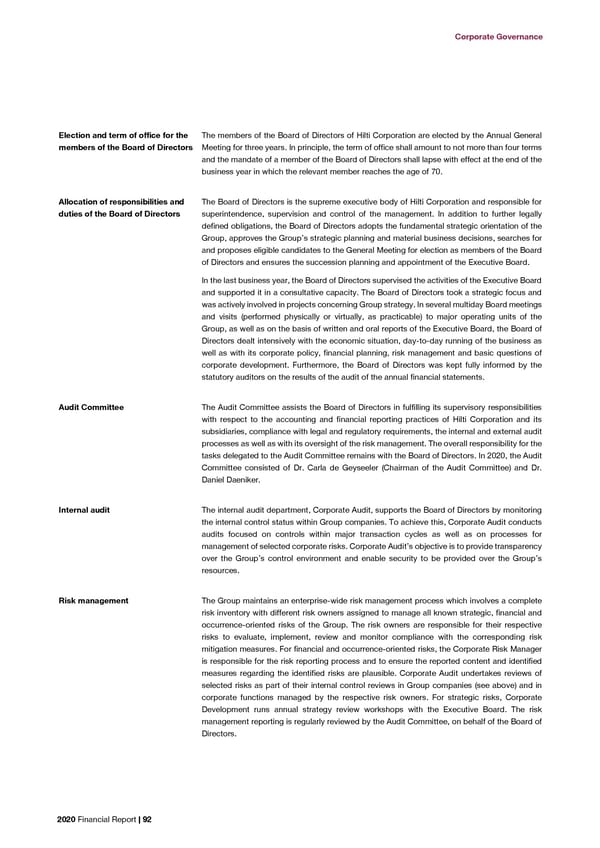Corporate Governance Corporate Governance Election and term of office for the The members of the Board of Directors of Hilti Corporation are elected by the Annual General Shareholders’ rights Details of share capital are given in the Group financial statements (see note (19)). In principle, members of the Board of Directors Meeting for three years. In principle, the term of office shall amount to not more than four terms resolutions of the General Meeting are passed by absolute majority of the voting shares and the mandate of a member of the Board of Directors shall lapse with effect at the end of the represented. A majority of at least three quarters of the voting shares represented at the General business year in which the relevant member reaches the age of 70. Meeting is required for: an amendment to the Articles of Association, an increase in the share capital, the buyback of shares, the restriction or cancelation of the subscription right, mergers Allocation of responsibilities and The Board of Directors is the supreme executive body of Hilti Corporation and responsible for with other companies, transformation of the company into another legal form or the dissolution duties of the Board of Directors superintendence, supervision and control of the management. In addition to further legally of the company. defined obligations, the Board of Directors adopts the fundamental strategic orientation of the Group, approves the Group’s strategic planning and material business decisions, searches for Auditors The examinations of the Group financial statements and the financial statements of Hilti and proposes eligible candidates to the General Meeting for election as members of the Board Corporation are conducted by PricewaterhouseCoopers AG, St. Gallen (leading auditor). The of Directors and ensures the succession planning and appointment of the Executive Board. company was reappointed in March 2020 for the 2020 year. The auditor-in-charge has been responsible for the mandate from 2019 following a partner rotation after the 2018 year. In In the last business year, the Board of Directors supervised the activities of the Executive Board respect of the 2020-year, audit fees of PricewaterhouseCoopers amount to CHF 2.2 million and supported it in a consultative capacity. The Board of Directors took a strategic focus and whereas the non-audit fees amount to CHF 0.2 million. Total audit fees of the Group, including was actively involved in projects concerning Group strategy. In several multiday Board meetings audits not performed by PricewaterhouseCoopers, amount to CHF 2.6 million. and visits (performed physically or virtually, as practicable) to major operating units of the Group, as well as on the basis of written and oral reports of the Executive Board, the Board of Directors dealt intensively with the economic situation, day-to-day running of the business as well as with its corporate policy, financial planning, risk management and basic questions of corporate development. Furthermore, the Board of Directors was kept fully informed by the statutory auditors on the results of the audit of the annual financial statements. Audit Committee The Audit Committee assists the Board of Directors in fulfilling its supervisory responsibilities with respect to the accounting and financial reporting practices of Hilti Corporation and its subsidiaries, compliance with legal and regulatory requirements, the internal and external audit processes as well as with its oversight of the risk management. The overall responsibility for the tasks delegated to the Audit Committee remains with the Board of Directors. In 2020, the Audit Committee consisted of Dr. Carla de Geyseeler (Chairman of the Audit Committee) and Dr. Daniel Daeniker. Internal audit The internal audit department, Corporate Audit, supports the Board of Directors by monitoring the internal control status within Group companies. To achieve this, Corporate Audit conducts audits focused on controls within major transaction cycles as well as on processes for management of selected corporate risks. Corporate Audit’s objective is to provide transparency over the Group’s control environment and enable security to be provided over the Group’s resources. Risk management The Group maintains an enterprise-wide risk management process which involves a complete risk inventory with different risk owners assigned to manage all known strategic, financial and occurrence-oriented risks of the Group. The risk owners are responsible for their respective risks to evaluate, implement, review and monitor compliance with the corresponding risk mitigation measures. For financial and occurrence-oriented risks, the Corporate Risk Manager is responsible for the risk reporting process and to ensure the reported content and identified measures regarding the identified risks are plausible. Corporate Audit undertakes reviews of selected risks as part of their internal control reviews in Group companies (see above) and in corporate functions managed by the respective risk owners. For strategic risks, Corporate Development runs annual strategy review workshops with the Executive Board. The risk management reporting is regularly reviewed by the Audit Committee, on behalf of the Board of Directors. 2020 Financial Report | 92 2020 Financial Report | 93
 2020 Financial Report Page 93 Page 95
2020 Financial Report Page 93 Page 95